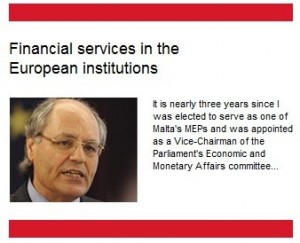 It is nearly three years since I was elected to serve as one of Malta’s MEPs and was appointed as a Vice-Chairman of the Parliament’s Economic and Monetary Affairs committee.
It is nearly three years since I was elected to serve as one of Malta’s MEPs and was appointed as a Vice-Chairman of the Parliament’s Economic and Monetary Affairs committee.
As we are too well aware, the last few years have been dominated by a crisis of the financial sector, which caused a worldwide recession, followed by a sovereign debt crisis in some European countries. In both cases, a crisis in one country or financial sector engulfed not just one, but all 27 EU countries. This is not surprising.
In the past twenty years Europe’s financial markets have become increasingly integrated and interlinked. Most financial institutions are owned by multi-nationals and in most cases cannot be effectively regulated by national law. While more liquid financial markets allow individuals to transfer money across borders at the click of a button, this interoperability also brings more risks.
As a result, it is logical that most financial regulation is now decided at EU rather than national level. And following the crisis, which revealed a lack of effective governance of the financial sector, since the 2009 elections, new legislation has been adopted on hedge funds, capital requirements, derivatives, deposit guarantees, short-selling and credit default swaps. It is a list that will get longer in the remaining two years of the legislative term.
Broadly speaking, the Parliament’s legislative work focuses on three main areas: macro-prudential supervision, sectoral legislation for each part of the financial sector, and economic governance of the eurozone – with the ‘six pack’ setting out the rules that will govern the management of public finances and the EU’s Stability and Growth Pact.
Following the financial crisis of 2007-8, plans were put in place to create European supervisory bodies for the banking sector, insurance and pensions, and securities and markets, with a new European Systemic Risk Board operating out of the European Central Bank to act as a ‘watchdog’ in order to make sure that bubbles in the financial markets are controlled.
The scale of the lobbying operation by the big firms and national regulators is vast. However, I must say that lobbying from Malta to date has been conspicuous by its absence. However companies that throw money around and insist that regulation should be flatly rejected tend not to be effective. The most effective players focus on the technical details of legislation. This is where most of the Economic committee’s work takes place. Although there are a few exceptions debates on, not on basis of whether regulation per se is good or bad, but on how to make it work most effectively.
The law-making process in Brussels is long and complex and there are a number of ways to shape legislation. The first stage is to be on the ball when the Commission publishes Green Papers and open consultations in advance of proposing legislation. At this stage, national governments and industry have the chance to voice their opinion and any concerns they might have.
In the coming months the legislative workload will continue. The centre-piece is the CRD IV directive which will determine how much core capital banks are required to hold on their balance sheets. This, alongside legislation on market abuse and insider trading, accounting standards, and regulation of financial instruments, indicates that the pace of financial regulation will continue to be fast.
As I have said, the scope for rejecting draft regulation out of hand is very limited. Most financial regulation is decided by qualified majority voting. The proposals to establish a financial transactions tax and a common consolidated corporate tax base are exceptions where countries can use a national veto.
With Europe struggling to cope with the economic fall-out from the financial and sovereign debt crises, the Economic committee, of which I form part, has been in the eye of the political storm. In that time I have been struck by the constructive and detailed way in which MEPs of many political persuasions have worked on financial sector reform. We do not always reach consensus between the main political groups, but I cannot recall a single major law which has been opposed outright by either the centre-left Socialist group or the centre-right EPP. In fact, by being legislators rather than ideologues I think we have struck a decent balance – delivering strong regulatory standards but safeguarding Europe’s status as a financial and business centre.
– Insight by FinanceMalta: Friday, 29th June 2012


38 responses to “Financial services in the European institutions”
The articles you write help me a lot and I like the topic
Thank you for your articles. They are very helpful to me. Can you help me with something?
You’ve the most impressive websites.
Thank you for your articles. I find them very helpful. Could you help me with something?
Sustain the excellent work and producing in the group!
Thank you for your articles. They are very helpful to me. May I ask you a question?
The articles you write help me a lot and I like the topic
Thank you for your articles. They are very helpful to me. Can you help me with something?
Thank you for writing this post!
Thank you for writing this post!
Thank you for your articles. I find them very helpful. Could you help me with something?
Your articles are extremely helpful to me. May I ask for more information?
Please tell me more about your excellent articles
Thank you for your articles. They are very helpful to me. May I ask you a question?
You’ve the most impressive websites.
Thank you for your articles. I find them very helpful. Could you help me with something?
Thank you for sharing this article with me. It helped me a lot and I love it.
Thank you for being of assistance to me. I really loved this article.
You’ve been great to me. Thank you!
Thank you for your help and this post. It’s been great.
Hey would you mind letting me know which hosting company you’re utilizing?
I’ve loaded your blog in 3 different browsers
and I must say this blog loads a lot faster then most.
Can you recommend a good hosting provider at a reasonable price?
Kudos, I appreciate it!
I am sure this article has touched all the internet users, its really really
fastidious article on building up new website.
Financial services in the European institutions
http://aandspests.com/component/k2/item/2-having-more-children-could-slow-aging?start=52920
Financial services in the European institutions
https://shortbookreviews.com/ardennes-1944-antony-beevor/
Financial services in the European institutions
https://www.voyance-respectable.fr/christophe-medium-voyance-cartomancie/?cid=2638
男性 型 ラブドール この忙しい生活の中でテレビでニュースを聞くのは本当に大変なので、そのためにウェブを使って最新のニュースを入手しています。
Making hard to understand topics accessible, you’re like the translator I never knew I needed.
I appreciate how you’ve explained things so clearly. It really helped me understand the topic better.
Making hard to understand concepts readable is no small feat. It’s like you know exactly how to tickle my brain.
Elegant and insightful, you tackle hard to understand issues like you’re dancing through words. Shall we dance some more?
The Writing is like a favorite coffee shop where the drinks are always warm and the atmosphere is inviting.
This post has been incredibly helpful, like a guiding hand in a crowded room. The guidance is much appreciated.
This Writing is a treasure trove of knowledge. Thank you for The contributions!
I’m always excited to see The posts in my feed. Another excellent article!
Appreciate the balance and fairness, like a judge, but without the gavel.
Financial services in the European institutions
https://aviationmetric.com/tag/starlus-airlines/
Appreciate the clarity you bring to this topic. It’s like you’re speaking to five-year-olds, which is perfect for me.
ラブドール リアル 本物の人形の購入者が愛情を作った後に使用するためのクリーニングのヒント